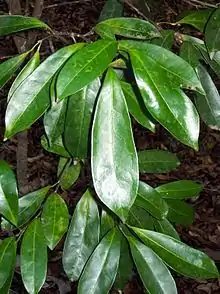Fontainea australis
Fontainea australis is a rare[1] rainforest plant from eastern Australia. The common name is southern fontainea. It grows in sub tropical rainforest at low altitudes on basaltic alluvial soils. Distributed from the Wilsons River (New South Wales) to the Tallebudgera Valley in south eastern Queensland.[2]
| Fontainea australis | |
|---|---|
 | |
| Scientific classification | |
| Kingdom: | Plantae |
| Clade: | Tracheophytes |
| Clade: | Angiosperms |
| Clade: | Eudicots |
| Clade: | Rosids |
| Order: | Malpighiales |
| Family: | Euphorbiaceae |
| Genus: | Fontainea |
| Species: | F. australis |
| Binomial name | |
| Fontainea australis Jessup & Guymer | |
Description
A shrub or small tree to 5 metres tall. Leaves are 6 to 9 cm long and 2 to 3.5 cm wide,[3] alternate on the stem. Reverse ovate or elliptic in shape with a long leaf tip, and narrow wedge shaped at the leaf base. The leaf stalk are between 5 and 21 mm long, swollen at both ends, and somewhat channelled. Small white flowers appear on panicles flowers December to January. The fruit matures in July, being a red fleshy ovate shaped capsule, 2.3 cm in diameter.
References
- Burke, Tony (Minister of S, E, W, P and C) (2010-10-01). "Approved Conservation Advice for Fontainea australis (Southern Fontainea)" (PDF). Australia Department of Sustainability, Environment, Water, Population and Communities. Retrieved 2020-08-11.
{{cite web}}: CS1 maint: multiple names: authors list (link) - Floyd, A. G. (2008). Rainforest Trees of Mainland South-eastern Australia (2nd, Revised ed.). Lismore, New South Wales: Terania Rainforest Publishing. p. 150. ISBN 978-0-958943-67-3. Retrieved 2010-06-02.
- "Fontainea australis". PlantNET - NSW Flora Online.
